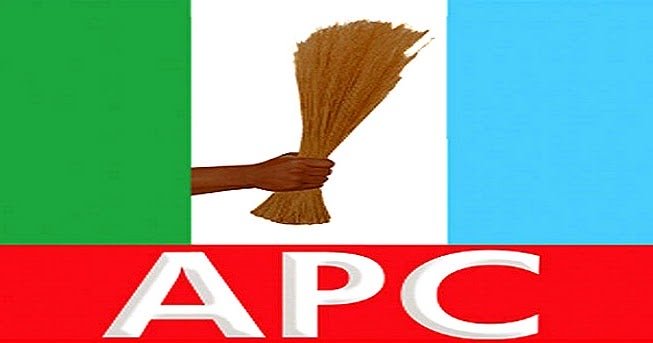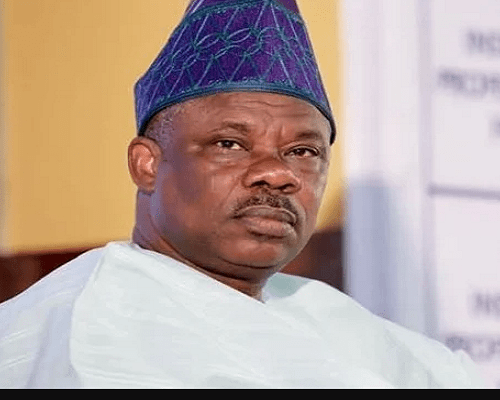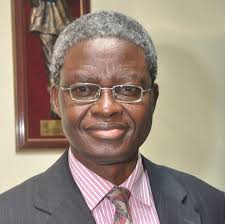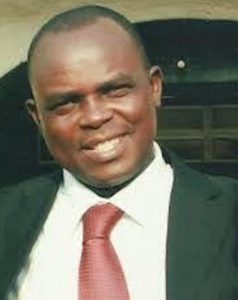The Adamu whoredom applies to Iyorchia Ayu, the current chairman of the PDP as well.

In Russia’s 1998 St. Petersburg local assembly elections, incumbent Oleg Sergeyev had been a thorn in the flesh of totalitarian governor, Vladimir Yakovlev. Upon Sergeyev’s launch of his bid to replace him, Yakovlev waited till the election date to sting him with his amusingly ingenious strategy. On voting day, voters, the majority of who were illiterate, were at sea when they found two of their adored candidate’s namesakes on the ballot – Oleg Sergeyev and Oleg Sergeyev. The former was a pensioner and the latter, an unemployed man, both of whom had no qualification for the office they sought but were implanted decoys by Yakovlev. Voters eventually cast their votes for the “wrong” Sergeyev as the authoritarian governor had planned.
Nic Cheeseman and Brian Klaas’ classic, How To Rig An Election (2018) told the above story to drive home its thesis that, even with the prevalence of multiparty elections, counterfeit democrats in the leadership of nations still devise the most effective but invisible cunning of stealing the outcomes of elections well before polling days, without being caught. Since Saturday’s coronation of the former governor of Nasarawa State, Abdullahi Adamu, as chairman of the All Progressives Congress (APC), the above story has refused to stop preying on my subconscious.
At that convention where Adamu went through a kingly coronation, Buhari stole the Yakovlev blueprint, with minor adjustments, but with the same wily intention. It was such that optimists who had waited patiently, with bated breath, for a disruption of the iniquitous status quo, at the final culmination of the Adamu installation, must be in a very sober mood now. The ones among them who believed that 2023 would be the moment that Nigeria would be making a U-turn from its current path of ruination, went home dejected and terribly downcast. It is obvious that an admixture of the desperation for Adamu’s candidacy by President Buhari, the deadly horse-trading that went into it, the ruination of ambitions and the billions of naira that must have been tethered by the groove of the coronation, are all targeted at one thing: To make post-2023 Nigeria indistinguishable from and a continuation of the Buhari presidency. Cheeseman and Klaas’ description of that mindset is that, “Thirty years ago, the main aim of the average dictator was to avoid holding elections; today, it is to avoid losing them” and continue in office through proxies and by stealth.
If Shakespearean Brutus’ famous/infamous quote, “it is the bright day that brings forth the adder, And that craves wary walking” is anything to go by, Adamu’s coronation and the whoredom that the two dominant political parties – the APC and the Peoples Democratic Party (PDP) – have become, are very frightening signposts that Nigeria is in for more grueling socio-political afflictions, post-Buhari. In that quote, Brutus forewarned Romans that, at a time of peace following the end of the civil war which the time was, allowing Julius Caesar to seize too much power was akin to leading him on to become a despot. Adder, which Brutus likened Caesar to, was a V-shape-headed poisonous snake that had zig-zag markings on its back and eyes partially covered with scales. This gave adders a deceptive appearance. To Brutus, while it is a sunny day, Romans must be wary of stepping on the adder.
But Buhari has led Nigerians right on, to step on the adder. Abdullahi Adamu, his queer but the bosom choice for the chairmanship of the APC, has engendered so many inquisitions, bothers and inquiries. Born in Keffi in July 1946, Adamu joined politics in 1977 as a member of the Constituent Assembly, became a member of the National Party of Nigeria (NPN), its secretary-general in Plateau State, and in 1997, joined the United Nigeria Congress Party (UNCP). In 1998, he became a founding member of the PDP, becoming a two-term governor of the party and Secretary of its Board of Trustees (BOT). In a renowned case of political prostitution, Adamu was a member of the new PDP that fused into the ruling APC and since 2011, he has been in the Senate, representing Nasarawa West. Arrested by the Economic and Financial Crimes Commission (EFCC) in February 2010 for allegedly embezzling $100 million of money belonging to the State he governed and which was earmarked for public projects, characteristically of the effete Nigerian anti-corruption fight, Adamu still got himself elected senator in 2011.
Aside the probable quest to reify the rule of gerontocrats that might be at the core of Buhari’s queer quest of getting Adamu to be the chairman of the APC at all costs, there are talks that his major fascination with an Adamu candidacy is the latter’s disdain for a Leader of the party who wants to be president of Nigeria. With Adamu as chair, all hopes of any lout badgering into the presidential groovy train would be dashed. With these “laudable” credentials as fascinating paradoxes, Adamu’s EFCC baggage and his senescence became secondary to a president desirous of controlling the lever of the political process and ensuring the emergence of a successor president, not totally dissimilar to him in drudgery and incapacity.
The Adamu whoredom applies to Iyorchia Ayu, the current chairman of the PDP as well. Elected senator by his Tiv people of Benue State during the Third Republic, Ayu became president of the Senate in 1992 but was impeached in November of the following year, later becoming General Sani Abacha’s minister of Education. Thereafter, he held various ministerial positions in the cabinet of President Olusegun Obasanjo’s PDP, between 1999 and 2005.
Aside Adamu’s baggage and his political prostitution that have become inconsequential to a “change”-driven APC, what has become an issue for discussion in recent times, is the beehive-like swarming of the ruling party by erstwhile PDP commissars, who are taking strategic positions in the APC. Apart from Adamu, as I write this, the narrative has shifted from Ken Nnamani, the former PDP Senate president, who was hitherto primed to be engrafted into and become the party’s deputy chairman (South) to Chief Emma Eneukwu, a former All Nigeria Peoples Party (ANPP) national publicity secretary. Another political bigwig who is being essentialised into the core of APC is Iyiola Omisore, a former PDP stalwart, and senator, who is poised to become the party’s national secretary, among other political birds of passage. Apparently seeking to remove this political prostitution as being the essence of Nigerian politics, a couple of weeks ago, a Federal High Court in Abuja, presided over by Justice Inyang Ekwo, ordered Ebonyi State governor, David Umahi, to vacate office after his defection from the PDP to the APC. According to the judge, upon his defection, Umahi was no longer entitled to be called a governor. A similar fate may be awaiting the governor of Cross River State, Ben Ayade.

In spite of the theoretical postulation that politics is about compromise, Uzor Maxim Uzoatu, in a 2021 piece, drew a parallel between prostitution and spineless carpet-crossing in Nigeria. According to him, there are “more male prostitutes in the crooked field of partisan politics than there are female harlots in the brothels across Nigeria.” A similar trope was canvassed by Timothy and Charity Doyle in their 2008-published book, Political Prostitution, as well as in University of Laiden’s Joyce Outshoorn’s edited book, The Politics of Prostitution. The latter book talks about the democratic states and the globalisation of sex commerce. They both however seem to be saying that there is an unbroken connection, one between the history of prostitution and politics, and an unchanging story in the recorded experience between sexual exploitation and the violent mistreatment of the female person by men. These, they likened to the indiscriminate political whim of politicians in jumping political beds. In both – the female body and political office – there is an attempt to use and show them as elements susceptible to and captured by purchase.
The Adamu whoredom applies to Iyorchia Ayu, the current chairman of the PDP as well. Elected senator by his Tiv people of Benue State during the Third Republic, Ayu became president of the Senate in 1992 but was impeached in November of the following year, later becoming General Sani Abacha’s minister of Education. Thereafter, he held various ministerial positions in the cabinet of President Olusegun Obasanjo’s PDP, between 1999 and 2005. However, in December 2005, Obasanjo, without any justifiable reason, dismissed Ayu. Upon falling out with the president, Ayu left the PDP, joined the Action Congress of Nigeria (ACN), and teamed up with Atiku Abubakar, becoming head of his campaign team. However, in February 2007, Ayu was arrested and arraigned by a federal court on charges of terrorism. It would appear that from 1999, the major criterion for consideration for the national chairmanship of the PDP and now the APC, is a history of indictment for corruption.
I went into the political history of the chairmen of the two major political parties in Nigeria with the aim of showing that if the foundations of the two dominant parties are this polluted with whoredom and undisguised harlotry, what we will be erecting on their structures are superstructures that are compromised, ab-initio. The selection of Adamu was not only not democratic, it was also not in the fashion of selection in a monarchy. It has a major resemblance with whoredom, where the prostitute goes into bed with the most cash-flavoured seminal fluid.
It will be difficult for us to impeach the seminal legal doctrine, snippets of what we also have in social relations, which holds that “from a dishonorable cause, an action does not arise,” expressed in the Latin maxim, ex turpi causa non oritur actio.This legal maxim states that a plaintiff cannot pursue legal relief and damages if they arise in connection with their own tortious act. It is reinforced in the English case of Hewison v Meridian Shipping Services Pte. Ltd. In that, an employee who came into office by reason of concealing the fact that he suffered from epilepsy, upon approaching the court for compensation in a claim for loss of earnings as a result of his employer’s negligence, the court held that his deception would prevent him from obtaining similar employment in future.
Judging by the financial and coercive powers that incumbents possess in Nigeria, this first major foot thrust forward by Buhari into 2023 in coercively imposing his affectionate candidate as chairman of APC, reminds one of Brutus and the adder. While the Nigerian day is sunny, Nigerians must be wary of this adder that Buhai is coercing us to step on. As it is said of every “nothing” upon which if “something” is erected, this “something” will ultimately share semblance and similar umbilical cord with the foundational “nothing” wherein we are trapped as a people.
…can somebody tell minister of Works and Housing, Babatunde Fashola to keep shut and stop heaping salt on the injury of Nigerians? Last Friday, he had said in a Channels television interview that the APC deserved re-election because the party had performed well enough and that the party indeed answers to the political party classification of progressivism. I was so sickened by this unfeeling grandstanding that I immediately went out to puke.
Similarly, as we move on, Iyorchia Ayu’s PDP’s foot will be encumbered by a sore of gangrenous proportion as that of Abdullahi Adamu. Unfortunately, it is from these two men that the leader, who is expected to pilot Nigeria to the utopia, 2023 – the Nigerian year of regeneration, redemption and sanity – will emerge. It will seem that our fate as a people will then be nothing more than the script of Samuel Beckett’s Waiting for Godot. In this play, two characters, Vladimir (Didi) and Estragon (Gogo) are engaged in several layers of discussion and encounters, as they await a titular Godot who, at the end of the day, never arrives.
By the way, can somebody tell the minister of Works and Housing, Babatunde Fashola to keep shut and stop heaping salt on the injury of Nigerians? Last Friday, he had said in a Channels television interview that the APC deserved re-election because the party had performed well enough and that the party indeed answers to the political party classification of progressivism. I was so sickened by this unfeeling grandstanding that I immediately went out to puke.
“First of all, there is nothing patented about the use of the word ‘progressive.’ Let me dispel that quickly. Progressivism for me is being concerned about improving the human condition. All of the investments we have made, whether for business or employment, aim at only one thing — improving the human condition.
“Let me just remind you that our opponent had 16 years. We beat them at the peak of power when they had almost 30 governors. We beat them again in 2019, and we will do it again, because I don’t remember them providing one alternative to the options we have given or alternative to the measures that we have proposed,” he had said.
Apart from the incoherent fallacy of ascribing 30 governors to the PDP when the APC beat the PDP – as the party had 23 governors, out of which five defected to APC in 2013 – sometimes, one is led into believing that some of these Star Boy Governmental Miracle Workers are creations of our limited estimations of their elan. If Lai Mohammed had been the author of that distressing statement, it would have been understood. That it was coming from a Fashola, reputed for his miracle-working strides in Lagos, equating progressivism with infrastructure is the unkindest cut. Does he know that the so-called infrastructural binge of the Buhari government is totally disconnected from the people? Is he aware that the infrastructure is brought about by a government that totally abandoned the intangible progress of nationhood of unifying disparate peoples of the republic but chose instead to hawk misery in daylight to the people? Does he know that Nigerians had never witnessed this level of hopelessness and misery of the Buhari government since Lord Lugard’s amalgamation?
We can only – apologies to Bola Ige – siddon look, believing that this too shall pass.
Interrogating Archbishop Akinfenwa’s Passing The Baton
The book is both a historical work, as well as a theological shuttle into the essence of faith and the expectations of the world from a Christian believer. It is one which all must have and read, for enlightenment, teaching and understanding of the role of Christian church fathers in the propagation of the faith, irrespective of religious leanings.
If any African needs an understanding of the spiritual lens with which colonial Europe viewed the continent and its peoples, Richard Henry Stone’s In Africa’s Forest And Jungles: Six Years Among the Yorubas, about an American missionary, who was a representative of the Southern Baptist Convention’s account of his sojourn in Africa during the nineteenth century, tells the story very poignantly. Among others, Stone had written that “They (Nigerians) are the tortured slaves of superstitions which destroy everything like the peace of mind, and they know nothing of that happiness that is found in every place worthy of the name of a Christian home. In this life they are in constant dread of the unseen power of malignant spirits; and in death, not a single ray of hope disperses the gloom of the grave: they seem to pass away in sullen, speechless despair. In religious things, their minds are a desert, a wilderness.”
However, when it came to writing about the Osoogun, Iseyin Local Government, Oyo State-born Bishop Ajayi Crowther, Stone had said that before he left Africa, he “became well acquainted with him and learned to love and venerate him very sincerely; for he was gentle, humble and sympathetic, and was a great comfort to me in a time of deep distress.”
Since then, so many writers have told the story of that 12-year old captured African boy sold to the Portuguese by slave hunters in 1821, who later became so useful to the propagation of the Christian faith in Africa, translating the Bible into Yoruba. It is said that a Sierra Leonean former Igbo slave boy, named Christopher Taylor, who worked under Crowther as the Bishop of the Niger in the 1800s, translated the Bible into Igbo language. However, the most recent of works on Crowther is the book, Passing The Baton, authored by the Archbishop of the Anglican Church, Dr Joseph Olatunji Akinfenwa. A reworking of his Ph.D. thesis, in the book, Akinfenwa highlights Crowther’s consequential struggles to weave together a Christian faith in Africa and how his descendants and family tree have continued this work of situating the church in the entire project of spreading the faith.
The major thrust of Akinfenwa’s book is to interrogate the succession of family trees in ministerial assignments in Nigeria. For instance, how many children of Christian ministers are retained in the church of their parents, long after their forebears had translated mortality for immortality. In this book, he cites so many instances to back up his claim. However, as the Yoruba will explain this dilemma in their quip that the faith of the father is helpless to rescue his child from Armageddon – igbagbo baba o gb’omola, this has been the case in both Pentecostal and orthodox churches over the centuries.
Akinfenwa’s methodic elevation of this work from a doctoral thesis, with its turgid academic lingo and cants, into an accessible work of art is commendable. The book is both a historical work, as well as a theological shuttle into the essence of faith and the expectations of the world from a Christian believer. It is one which all must have and read, for enlightenment, teaching and understanding of the role of Christian church fathers in the propagation of the faith, irrespective of religious leanings.
Festus Adedayo is an Ibadan-based journalist.





















